Cast Partial Denture
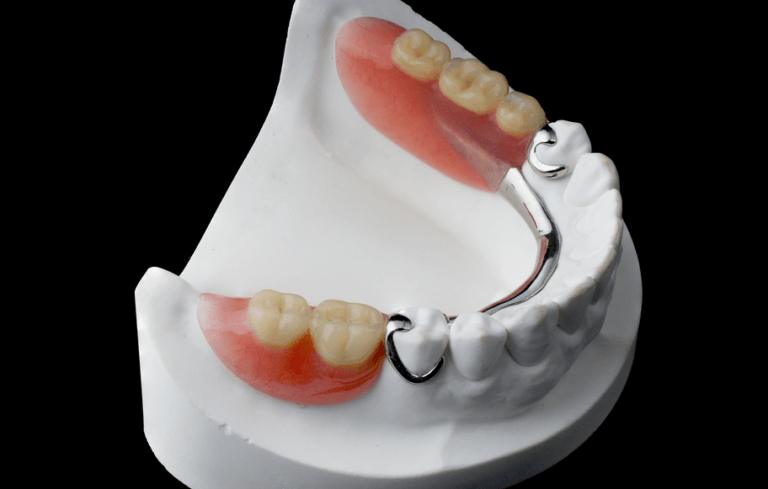
What Are Cast Partial Dentures?
Cast Partial Dentures are a type of removable partial dental prosthesis that serve as a cost-effective and non-invasive solution for individuals missing one or more teeth. Unlike full dentures, which replace all of the teeth in one or both dental arches, cast partial dentures are used when some natural teeth still remain in the mouth. These partial dentures consist of a metal framework that is carefully crafted to fit around the existing teeth, providing a stable foundation for the acrylic replacement teeth to be attached.
Cast partial dentures are a reliable and time-tested dental solution that effectively restores both the appearance and function of your smile. Before deciding on whether Cast Partial Dentures are right for you, there are some things you should know:
- Who Needs Cast Partial Dentures?
- What Are The Advantages Of Cast Partial Dentures?
- What Are The Alternative Treatments If I Do Not Choose Cast Partial Dentures?
- How Much Does Cast Partial Dentures Cost?
- What Are The Steps In The Cast Partial Dentures Procedure?
- Can I Have Cast Partial Dentures If I Am Pregnant?
- How Long Does Cast Partial Dentures Last?
- What Are Common Problems with Cast Partial Dentures?
If you have any further questions about Cast Partial Dentures or other dental services offered at Atlas Dental, please contact us.

Free Phone Consultation
Have questions about cosmetic dentures for missing teeth? Book a free phone consult with our Toronto dentist

5 star google reviews
Our patients love their cosmetic looking denture smile! See for yourself why patients choose Atlas Dental.

Book a denture appointment online
We make custom fitted dentures to help our patients smile confidently again.
Who Needs Cast Partial Dentures?
Cast partial dentures are a versatile dental solution suitable for a wide range of individuals who have experienced tooth loss or are about to undergo tooth extraction. If you find yourself in any of the following situations, cast partial dentures could be the ideal tooth replacement option for you:
- Missing Teeth: When one or more teeth are missing, it can lead to difficulties in chewing, speech impediments, and a lack of confidence in your appearance. A cast partial denture can fill these gaps, restoring your ability to eat comfortably and speak clearly.
- Preserving Natural Teeth: Preserving the integrity of your remaining natural teeth is crucial for maintaining oral health. If you have a few missing teeth and leave the gaps untreated, it can cause the adjacent teeth to shift and move, potentially leading to alignment issues and bite problems. A cast partial denture prevents this movement, supporting the adjacent teeth and keeping them in their proper positions.
- Affordable Tooth Replacement: Compared to dental implants or fixed bridges, cast partial dentures are a more cost-effective tooth replacement option. They offer an affordable solution to replace missing teeth without compromising on functionality or aesthetics.
- Non-Candidates for Dental Implants: Some individuals may not be suitable candidates for dental implants due to factors such as inadequate bone density or certain medical conditions. In such cases, a cast partial denture can be an excellent alternative for restoring their smile and oral function.
- Temporary Tooth Replacement: If you are undergoing a dental treatment plan that involves multiple steps, a cast partial denture can serve as a temporary tooth replacement until the permanent solution, like a dental implant, can be placed.
- Improved Aesthetics: A cast partial denture not only restores missing teeth but also enhances the aesthetics of your smile. The prosthesis is custom-made to match the color, shape, and size of your existing teeth, creating a natural and seamless appearance.
- Boosted Self-Confidence: Regaining your smile can have a significant impact on your self-confidence and overall well-being. With a cast partial denture, you can confidently interact with others without worrying about hiding your missing teeth.
It’s essential to consult with a qualified dentist to determine if a cast partial denture is the right choice for your specific dental needs. They will conduct a comprehensive examination of your oral health, discuss your treatment goals, and help you make an informed decision about the most suitable tooth replacement option. If you have further questions about cast partial dentures, please contact us.
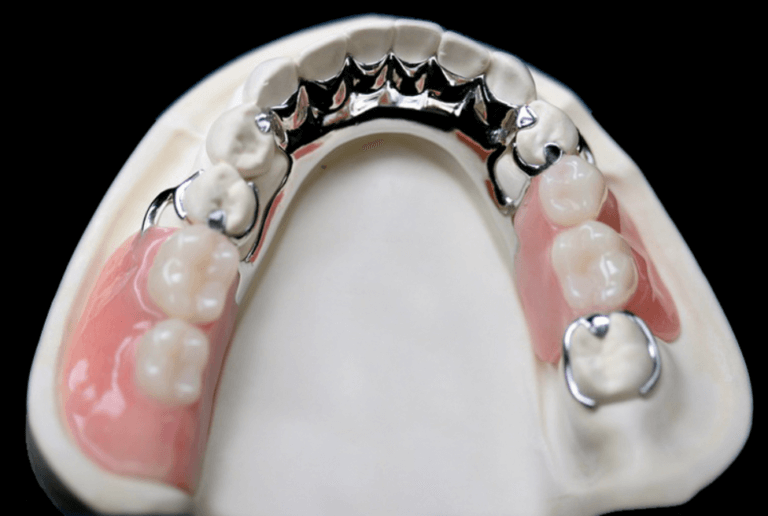
What Are The Advantages Of Cast Partial Dentures?
Cast partial dentures offer numerous advantages that make them a popular and effective choice for tooth replacement. Whether you have lost a few teeth or need to preserve the remaining ones, cast partial dentures can address your dental concerns in a variety of ways:
- Natural-Looking Appearance: Cast partial dentures are custom-made to match the color, shape, and size of your natural teeth. The metal framework used to support the denture is designed to be discreet, and the replacement teeth blend seamlessly with your existing dentition. This ensures a natural-looking smile that boosts your self-confidence.
- Enhanced Chewing Efficiency: Missing teeth can significantly impact your ability to chew and enjoy a variety of foods. Cast partial dentures restore your chewing function by replacing missing teeth, allowing you to eat comfortably and efficiently.
- Improved Speech: Gaps left by missing teeth can affect speech clarity, leading to pronunciation difficulties. Cast partial dentures fill these gaps, facilitating clear speech and communication.
- Preservation of Remaining Teeth: The metal framework of cast partial dentures provides support to the remaining natural teeth, preventing them from shifting or tilting into the empty spaces. This helps maintain the alignment of your teeth and reduces the risk of further tooth loss.
- Comfortable Fit: Cast partial dentures are custom-crafted to fit the unique contours of your mouth. This personalized fit ensures a comfortable wearing experience, reducing the likelihood of sore spots or irritation.
- Cost-Effective Solution: Compared to dental implants, which involve surgical procedures and individual replacement of teeth, cast partial dentures offer a more affordable tooth replacement option.
- Non-Invasive Treatment: The process of getting cast partial dentures does not require any surgery. It involves taking impressions of your mouth and creating a custom appliance that can be easily inserted and removed as needed.
- Versatility: Cast partial dentures can replace multiple missing teeth, regardless of their location in the mouth. Whether you have missing teeth in the front or back of your mouth, cast partial dentures can address your tooth replacement needs effectively.
- Long-Lasting and Durable: The metal framework of cast partial dentures makes them strong and durable, ensuring they can withstand the forces of regular chewing and last for many years with proper care.
- Easy Maintenance: Cast partial dentures can be removed for regular cleaning, making it simple to maintain good oral hygiene and keep your gums and remaining teeth healthy.
Cast partial dentures offer a host of advantages that make them a practical and efficient solution for tooth replacement. From restoring your smile’s natural aesthetics to improving chewing and speech, these custom-made dental appliances can significantly enhance your oral health and quality of life. If you have further questions about Cast Partial Dentures, please contact us.
What Are The Alternative Treatments If I Do Not Choose Cast Partial Dentures?
If you are considering tooth replacement options and decide that cast partial dentures are not the right choice for you, several alternative treatments are available to address your dental needs:
- Acrylic Partial Denture: Acrylic partial dentures are a more traditional and cost-effective option for replacing missing teeth. These dentures are made from a pink acrylic base that mimics the appearance of gums and holds replacement teeth. While they can be a temporary solution, they may not offer the same level of comfort and durability sturdier dentures.
- Single Tooth Denture (Flipper): A single tooth denture, commonly known as a “flipper,” is designed to replace a single missing tooth. It consists of a removable acrylic tooth attached to a pink acrylic base. While flippers are affordable and quick to fabricate, they are not as secure or long-lasting as other alternatives.
- Essix Denture: An Essix denture is a clear, transparent, and removable dental appliance made from a thin plastic material. It fits snugly over your existing teeth, replacing the missing ones. Essix dentures are often used as temporary solutions and are less noticeable than traditional dentures, but they may not be as durable as other options.
- Valplast Denture: Valplast dentures are flexible and lightweight dental prosthetics made from a thermoplastic material. These dentures are designed to adapt comfortably to the shape of your mouth and are a discreet alternative to conventional acrylic or cast partial dentures. Valplast dentures are known for their natural appearance and minimal metal-free design.
- Dental Implants: Dental implants are a permanent and highly effective solution for replacing missing teeth. A dental implant is a titanium post surgically inserted into the jawbone, acting as an artificial tooth root. A crown is then attached to the implant, providing a natural-looking and functional replacement tooth. Dental implants offer the most stable and long-lasting option but may require sufficient bone density and a more extensive treatment process.
- Dental Bridges: Dental bridges are fixed restorations that bridge the gap between missing teeth. They are supported by crowns placed on the adjacent natural teeth. Bridges are a reliable option for tooth replacement, but they require modifying the neighboring teeth to accommodate the crowns.
- No Treatment: While not a recommended long-term option, some individuals choose not to pursue any dental treatment for their missing teeth. Leaving gaps in your smile can lead to dental problems over time, such as shifting teeth, bite issues, and bone loss in the jaw.
Each alternative treatment mentioned above has its own advantages and considerations. Dental professionals can help you make an informed decision based on your individual dental health, lifestyle, and preferences. If you have further questions about Cast Partial Dentures, please contact us.
Cost of Partial Dentures
Partial Dentures can vary widely in cost depending on several factors, including the type of partial denture, whether it is for the upper or lower jaw, the materials used, and the location of the dental practice. Therefore, depending on the type of denture you are looking for, the cost can range from $462 to $1419 plus dental lab fee. The codes relevant to dentures in the Ontario Dental Association’s Suggested Fee Guide appear as follows:
Dentures, Partial, Acrylic Base (Provisional) (With or Without Clasps). (e.g. Single Tooth Dentures, Essix Dentures)
- 52101 – Maxillary: $462 + Dental Lab Fee
- 52102 – Mandibular: $462 + Dental Lab Fee
Dentures, Partial, Polymer, Resilient Retainer. (e.g. Valplast Flexible Partial Dentures)
- 52201 – Maxillary: $678 + Dental Lab Fee
- 52202 – Mandibular: $678 + Dental Lab Fee
Dentures, Partial, Acrylic, With Metal Wrought/Cast Clasps and/or Rests. (e.g. Acrylic Partial Dentures)
- 52301 – Maxillary: $775 + Dental Lab Fee
- 52302 – Mandibular: $775 + Dental Lab Fee
Dentures, Partial, Free End, Cast Frame/Connector, Clasps and Rests. (e.g. Cast partial Dentures)
- 53101 – Maxillary: $1419 + Dental Lab Fee
- 53102 – Mandibular: $1419 + Dental Lab Fee
Dentures, Partial, Tooth-Borne, Cast Frame/Connector, Clasps and Rests. (e.g. Cast partial Dentures)
- 53201 – Maxillary: $1319 + Dental Lab Fee
- 53202 – Mandibular: $1319 + Dental Lab Fee
Partial Dentures are sometimes considered a supplementary service by dental insurance plans and may or may not be covered by your dental insurance. Be sure to find out from your dental insurance plan provider how much you are eligible for before going ahead with dental treatment. Your dentist can help you submit an predetermination to your dental insurance. Our fees are consistent with the ODA Fee Guide.
For patients without dental insurance, Atlas Dental is pleased to offer dental financing through Dentalcard. Affordable payment plans start at 7.95% for terms of 6 months to 6 years. To learn more about Dentalcard dental treatment financing, follow this link.
What Are The Steps In The Cast Partial Dentures Procedure?
The process of getting a cast partial denture involves several steps, from the initial consultation to the final placement of the prosthesis. Let’s walk through the typical procedure for getting a cast partial denture:
- Initial Consultation: The first step is to schedule an appointment with a dentist for a thorough examination of your oral health. During this consultation, the dental professional will assess the condition of your teeth, gums, and jawbone, as well as discuss your treatment goals and preferences.
- Treatment Planning: Based on the examination results and your dental needs, the dentist will develop a personalized treatment plan. They will explain the different types of partial dentures available and help you choose the most suitable option for your situation.
- Taking Impressions: To create a custom-fit cast partial denture, the dentist will take precise impressions of your teeth and gums. These impressions serve as a mold for designing the denture, ensuring a comfortable and accurate fit. Please review these denture pre-visit instructions before your appointment.
- Try-In Appointment: Once the cast partial denture is fabricated, you will have a try-in appointment. During this visit, the dentist will check the fit, shape, and color of the denture to ensure it aligns perfectly with your natural teeth and gums. Any necessary adjustments will be made at this stage.
- Final Placement: After any adjustments are completed, your dentist will place the final cast partial denture. They will carefully position it in your mouth and check that it fits comfortably and securely. The dentist will also provide denture post-insertion instructions on how to insert and remove the denture properly, as well as how to care for it.
- Follow-Up Visits: After receiving your cast partial denture, you will have follow-up appointments to ensure that the denture fits well and functions correctly. Your dentist may make additional adjustments if needed, especially in the initial period of wearing the denture.
By following these steps and working closely with your dental professional, you can achieve a well-fitting and functional cast partial denture that seamlessly integrates with your natural smile. If you have further questions about cast partial dentures, please contact us.
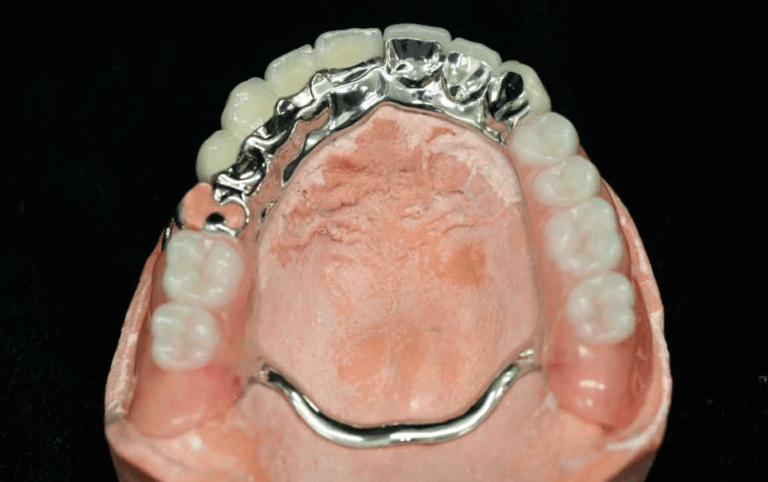
Can I Have Cast Partial Dentures If I Am Pregnant?
Pregnancy is a unique and special time in a woman’s life, and taking care of oral health during this period is essential for both the mother and the baby. Many dental treatments are safe during pregnancy, but certain factors need consideration when it comes to getting a cast partial denture. Here’s what you should know about having a cast partial denture if you are pregnant:
- Consultation with Your Dentist: If you are pregnant and considering a cast partial denture, it is crucial to inform your dentist about your pregnancy during your initial consultation. This information allows the dentist to tailor the treatment plan and choose the safest approach for your specific situation.
- Timing of Treatment: Pregnancy, particularly the first and third trimesters, can be sensitive periods for dental treatments due to potential risks involved. Elective dental procedures, such as getting a cast partial denture for cosmetic purposes, are often best postponed until after delivery. However, if there is a pressing need to replace missing teeth or address oral health issues, your dentist may recommend the most appropriate and safe course of action during pregnancy.
- Local Anesthetics and X-Rays: During pregnancy, avoiding unnecessary exposure to medications and X-rays is advisable. However, local anesthetics are generally considered safe for dental procedures, as long as they do not contain epinephrine. Your dentist will use an anesthetic that is safe for use during pregnancy.
- Considering Alternatives: If the timing of the cast partial denture treatment is not ideal during your pregnancy, your dentist may suggest temporary solutions or alternative treatments that can be safely done during this period. These temporary measures can provide relief until a more comprehensive treatment can be pursued after delivery.
- Oral Health and Pregnancy Outcomes: Research suggests that maintaining good oral health during pregnancy is linked to better pregnancy outcomes. Poor oral health has been associated with an increased risk of preterm birth and low birth weight. Thus, it is essential to prioritize your oral health and work with your dentist to develop a suitable dental care plan during pregnancy.
Having a cast partial denture during pregnancy is possible, but it requires careful consideration and communication with your dentist. Your dental professional will take into account your unique situation and ensure that any treatment provided is safe for both you and your developing baby. If you have further questions about cast partial dentures, please contact us.
How Long Does Cast Partial Dentures Last?
In general, cast partial dentures can last anywhere from 5 to 15 years or even longer. The durability and longevity of cast partial dentures will depend on several factors:
- Material Quality: The materials used in the construction of cast partial dentures play a significant role in their longevity. High-quality alloys, such as cobalt-chromium and titanium, are known for their strength and durability. These materials can withstand the forces of regular chewing and biting, ensuring that the partial dentures remain functional over time.
- Oral Hygiene: Proper oral hygiene is essential to prolong the life of cast partial dentures. Regularly cleaning the dentures, as well as maintaining good oral health by brushing and flossing the remaining natural teeth, helps prevent the buildup of plaque and bacteria that can damage the denture and surrounding tissues.
- Denture Care: Handle your cast partial dentures with care to avoid accidental damage. When removing or inserting the dentures, do so over a soft surface or a towel to prevent breakage if they are dropped. Avoid using abrasive cleaners or harsh chemicals that may damage the denture’s surface or compromise the metal framework.
- Regular Check-Ups: It is crucial to schedule regular check-ups with your dentist, even if you have cast partial dentures. Your dentist can monitor the fit and condition of the dentures and make any necessary adjustments to ensure optimal comfort and functionality.
- Changes in Oral Anatomy: Over time, changes in the jawbone and gums may occur, leading to alterations in the fit of the cast partial dentures. If the dentures start to feel loose or uncomfortable, or if you experience difficulty with chewing or speaking, it may be a sign that the dentures need to be adjusted or replaced to maintain a proper fit.
- Lifestyle Factors: Lifestyle habits, such as grinding or clenching the teeth (bruxism) and chewing on hard objects, can affect the longevity of cast partial dentures. If you have bruxism, your dentist may recommend a nightguard to protect the dentures from excessive wear.
With attentive care and regular dental check-ups, cast partial dentures can last for many years. However, it’s important to note that they are not intended to be permanent, and periodic adjustments or replacements may be necessary over time. If you experience any issues with your cast partial dentures or notice changes in their fit or function, schedule an appointment with your dentist for evaluation and appropriate maintenance. If you have further questions about Cast Partial Dentures, please contact us.
What Are Common Problems with Cast Partial Dentures?
While cast partial dentures are a reliable tooth replacement option, like any dental appliance, they can encounter certain issues over time. Being aware of these common problems can help you address them promptly and ensure the longevity and functionality of your cast partial dentures:
- Loose or Uncomfortable Fit: As your jawbone and gums change over time, the fit of your cast partial dentures may become loose or uncomfortable. This can lead to irritation and sore spots. If you notice any changes in the fit of your dentures, consult your dentist for adjustments or possible replacements.
- Worn or Fractured Teeth: The artificial teeth on your cast partial dentures can wear down or fracture with regular use. This is especially true if you grind or clench your teeth (bruxism). Regular dental check-ups can help identify any signs of wear and allow for timely replacement of the affected teeth.
- Broken or Bent Metal Framework: The metal framework that holds the dentures in place can become damaged due to accidents or improper handling. Bent or broken metal components can affect the stability and fit of the dentures.
- Irritation and Sore Spots: New dentures may cause some initial irritation and sore spots as your mouth adjusts to them. However, persistent sore spots or irritation may indicate an ill-fitting denture that requires adjustment.
- Bad Breath or Odor: Food particles and bacteria can get trapped under the denture, leading to bad breath or an unpleasant odor. Proper denture cleaning and maintaining good oral hygiene are crucial to prevent this issue.
- Discoloration: Over time, cast partial dentures may become discolored due to exposure to certain foods, drinks, or tobacco use. Regular cleaning and care can help minimize discoloration and keep your dentures looking their best.
- Difficulty Chewing or Speaking: If your cast partial dentures are not fitting correctly, you may experience difficulty with chewing or speaking. This can be a sign that the dentures need adjustments or replacements.
- Allergic Reactions: In rare cases, some individuals may experience allergic reactions to the materials used in the cast partial dentures, such as the metal alloys. If you develop any unusual symptoms, such as swelling or a rash, contact your dentist immediately.
Despite these potential issues, cast partial dentures remain a popular and effective tooth replacement option. If you encounter any concerns with your cast partial dentures, do not hesitate to consult your dentist for professional evaluation and appropriate solutions. If you have further questions about Cast Partial Dentures, please contact us.
We also think you’ll like…
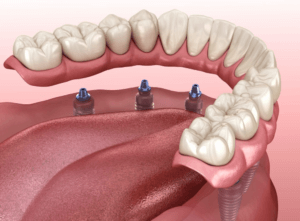
Implant Denture
Implant Denture What Is An Implant Denture? An Implant Denture, also known as an implant-supported overdenture, is a dental appliance designed to restore missing teeth
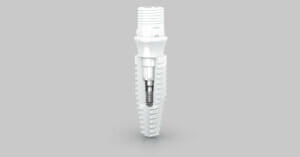
Zirconia Dental Implants
Zirconia Dental Implants What Are Zirconia Dental Implants? Zirconia dental implants are an alternative to traditional titanium dental implants for replacing missing teeth. Unlike titanium
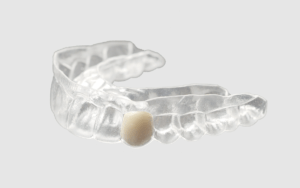
Essix Denture
Essix Denture What Is An Essix Denture? Essix Dentures are a type of removable denture crafted from transparent or translucent material, commonly known as polyethylene
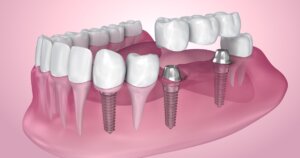
Dental Implant Bridge
Dental Implant Bridge What Is A Dental Implant Bridge? A dental implant bridge is a prosthetic device used to replace one or more missing teeth
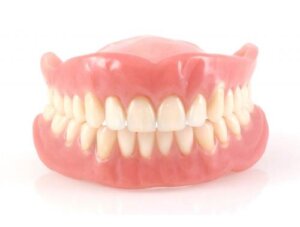
Immediate Complete Denture
Immediate Complete Denture What Is An Immediate Complete Denture? If you’re about to undergo a dental procedure that involves the removal of all your natural
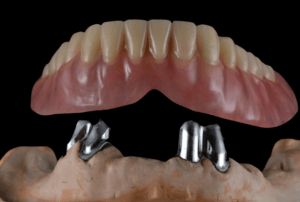
Tooth Supported Overdenture
Tooth Supported Overdenture What Is A Tooth Supported Overdenture? A Tooth Supported Overdenture is a type of removable complete denture prosthesis that rests over the

